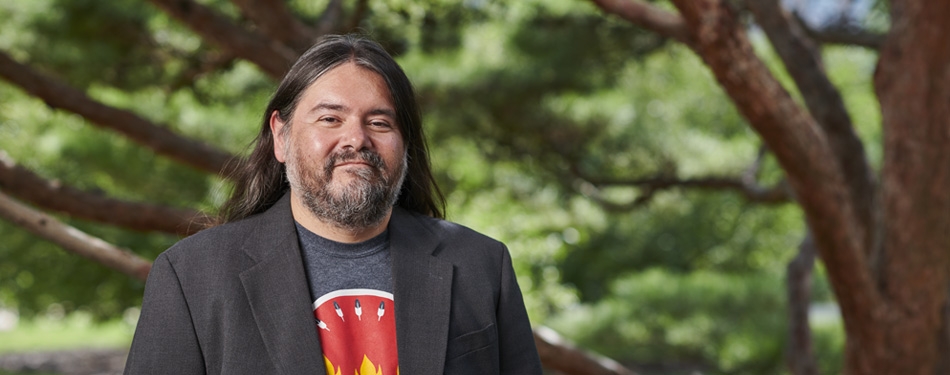Native American legal scholar and tribal court chief justice Matthew L.M. Fletcher, ’97, joins Michigan Law’s faculty.
Matthew L.M. Fletcher, ’97, an appellate tribal judge and former in-house counsel for Native American tribes, will return to his alma mater this fall as a full-time faculty member at the University of Michigan Law School. Fletcher serves as chief justice for two tribes, the Pokagon Band of Potawatomi Indians and the Poarch Band of Creek Indians.
Fletcher will serve as the Harry Burns Hutchins Collegiate Professor of Law, an endowed professorship that honors the former dean of the Law School who later served as the University’s fourth president. It aptly reflects the historic significance of his academic appointment at Michigan Law.
“I feel like this is kind of a homecoming,” said Fletcher, who has taught intermittently as a visiting professor at the Law School since 2011. “My ancestors have attended the University of Michigan since the 1900s. Nearly a dozen of my relatives have earned U-M degrees over the last century.”
Fletcher, a member of the Grand Traverse Band of Ottawa and Chippewa Indians, believes his great-great uncle, George Mamagona, who received a master’s degree in engineering in 1915, may well have been the first Native American to graduate from Michigan.
From tribal in-house counsel to appellate judge and legal scholar
Fletcher taught at the Michigan State University College of Law from 2006 to 2022, and at the University of North Dakota School of Law from 2004 to 2006.
He also was a visiting professor at Stanford Law School, the University of Arizona James E. Rogers College of Law, the UC-Hastings College of Law, and the University of Montana Alexander Blewett III School of Law.
“I have deep ties to the state of Michigan, so I wanted to stay here as long as I can,” Fletcher said. “It’s a dream come true to teach at U-M.”
After completing his law degree, Fletcher began practicing in-house for Native American tribes in the western United States.
“Most of my relatives who are Native Americans grew up in poverty and struggled mightily…I felt this was a place where I wanted to contribute and make a difference.”
“I wanted to take a job where I would have an immediate impact on individuals,” said Fletcher, noting that approximately one-third of all American Indians in the United States have incomes below the national poverty level.
“Most of my relatives who are Native Americans grew up in poverty and struggled mightily,” he added. “A number of them, who were taken from their homes by state and child welfare systems and adopted out into non-Indian homes, were lost forever. I felt this was a place where I wanted to contribute and make a difference.”
Fletcher’s early legal practice framed his scholarly work and inspired his articles on American Indian tribal law, tribal courts, and how the U.S. Supreme Court views tribal laws and tribal courts.
Later, when he became a university professor, he started working as a tribal judge.
“I am an appellate judge for 13 tribes at the moment, and I’ve had the opportunity to write more than 50 appellate opinions since 2005,” Fletcher said.
Bringing Anishinaabe philosophies to traditional legal curricula
During the coming fall term at U-M, he will teach courses in Federal Indian Law and Tribal Law at the Law School as well as undergraduate and graduate classes in Native American Studies in the College of Literature, Science, and the Arts.
Fletcher’s teaching centers on the development of Anishinaabe legal and political philosophies, which are radically different from those taught in traditional law school curricula.
“This is an alternate way to view the universe that permeates all the work I’ve done,” he said. “It serves as an introduction to a different kind of legal philosophy that’s prevalent in tribal courts.”
Fletcher believes Michigan Law students can benefit by having an introduction to tribal law and tribal courts in school, because they will need this background later in their law practices.
“Lawyers are finding that even if they want to avoid Indian law, they can’t,” he said. “At some point, they end up doing legal work in Indian country or with Indian tribes and Indian-owned companies that they didn’t expect.”
Fletcher plans to expand his scholarly research beyond federal Indian law to include the development of tribal law, customs, and traditions. He also intends to explore how Indian tribal political philosophies influence the current, and possibly the future, application of law.
Meanwhile, the Fletcher family’s century-long maize-and-blue tradition has been passed down to the next generation. Fletcher’s nephew, Nolan Fletcher, will be sophomore at Michigan this fall.
—Claudia Capos

